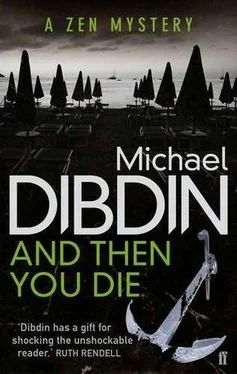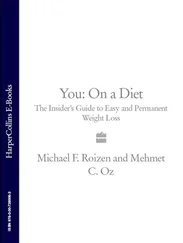Michael Dibdin - And then you die
Здесь есть возможность читать онлайн «Michael Dibdin - And then you die» весь текст электронной книги совершенно бесплатно (целиком полную версию без сокращений). В некоторых случаях можно слушать аудио, скачать через торрент в формате fb2 и присутствует краткое содержание. Жанр: Полицейский детектив, на английском языке. Описание произведения, (предисловие) а так же отзывы посетителей доступны на портале библиотеки ЛибКат.
- Название:And then you die
- Автор:
- Жанр:
- Год:неизвестен
- ISBN:нет данных
- Рейтинг книги:3 / 5. Голосов: 1
-
Избранное:Добавить в избранное
- Отзывы:
-
Ваша оценка:
- 60
- 1
- 2
- 3
- 4
- 5
And then you die: краткое содержание, описание и аннотация
Предлагаем к чтению аннотацию, описание, краткое содержание или предисловие (зависит от того, что написал сам автор книги «And then you die»). Если вы не нашли необходимую информацию о книге — напишите в комментариях, мы постараемся отыскать её.
And then you die — читать онлайн бесплатно полную книгу (весь текст) целиком
Ниже представлен текст книги, разбитый по страницам. Система сохранения места последней прочитанной страницы, позволяет с удобством читать онлайн бесплатно книгу «And then you die», без необходимости каждый раз заново искать на чём Вы остановились. Поставьте закладку, и сможете в любой момент перейти на страницу, на которой закончили чтение.
Интервал:
Закладка:
But that would not have done, any more than it would have done not to visit the beach every day. The truth was that Zen much preferred to avoid the sun, if at all possible, and also hated sitting still doing nothing for hours on end. But his instructions were to blend in, and to come to Versilia and not go to the beach would have made him an exception to the prevailing rule and thereby an object of interest and comment. So he put in his four or five hours a day, like going to the office, and then walked sedately home, resisting the impulse to bump into people, utter insulting innuendoes and make sarcastic remarks. It was a strain, but he had his orders.
Nor could he leave. His orders on this point too were clear. He was to remain exactly where he was until contacted. Besides, he had nowhere else to go. He had not returned to Rome since the death of his mother, and felt no desire to do so. To attempt another false return to Venice was even more out of the question. The mere thought of either alternative made him realize how cluttered with the past his life had become, how devoid of any viable future. This was still more depressing, and seemingly insoluble, so he tried to think of other things, or better still not to think at all. That was all he needed to do, he told himself for the umpteenth time, just stop thinking and enjoy this pleasant, calm, mindless existence that most people could only dream of. What was the matter with him? Why was nothing ever good enough?
He dropped in to the small alimentari where he did his daily shopping. His invitation to Gemma had been only partly motivated by a wish to know her better. The fact was that ever since his arrival he had been living off whatever cooked dishes the place had on offer that day, or those he could forage and prepare for himself, a very limited cuisine consisting largely of packet soups, frozen entrees, sandwiches and takeaway pizza. To dine out alone would be another anomaly of the kind he was not permitted by the terms of his contract. Even shopping alone, as a middle-aged male, was anomalous, but he had to eat.
He stocked up on coffee, milk, bread and a few eggs. The cashier looked at him in the same way that Franco did, as though she was confused by recognizing yet not being able to place him. That look, in another pair of eyes, could yet get him killed, he thought idly. The fact was that he didn't really care. The Mafia might not have killed him physically, but something in him had died, something without which life didn't really seem worth the effort. He just didn't care about anything, that was the real and lasting effect of l'incidente, and one which looked as though it might well stay with him throughout his long, tedious, enforced retirement, a nagging ache that no amount of therapy, exercise or hobbies would ever be able to dispel.
Opposite the grocery, from a white lorry parked at the kerb, fresh vegetables, fruit and eggs were being sold to a bevy of housewives, all of whom were giving the vendor a hard time about his quality, selection and prices, a daily ritual necessary to everyone's sense of dignity and self-esteem. The women knew that short of driving to one of the supermarkets on the highway inland, they were stuck with what Mario had on offer, in very much the same way that they were stuck with their husbands, children, relatives, homes and general lot in life. Their only perk was the right to bitch loudly and at length about the inequities of die situation, and in this they indulged freely. Mario, understanding that this was one of the costs of doing business, entered into the ensuing series of mini-dramas with gusto and vivacity, playing his part to the full.
Zen drifted back across to the shady side of the street, taking in the scene at the greengrocer's van, a cluster of young people on bicycles, a group of women cooing over a neighbour's baby, a man leaning against a concrete telephone pole eating an ice cream and eyeing the passers-by. He was wearing a ‘I-shirt with some sort of English slogan on it. Zen walked down two blocks to the end of the commercial area, then turned left into a street old enough to pre-date the rigid grid which had been imposed on later development, curving gently off past wrought-iron gates and spurts of greenery spilling over weathered walls. The villa which he had been assigned was about halfway along the curve, which ended at a crumbling gateway leading into one of the last remaining portions of the original pineta. There was virtually no traffic at all, and no sound to disturb the silence but the perpetual murmur of televisions and the occasional yapping of a small, neurotic dog kept by one of the neighbours.
He reached his gate, and for some reason paused before unlocking it to glance over his shoulder. There was no one in sight. So they already know where you live, said a voice in his head. 'Oh, shut up!' Zen muttered audibly. Such professional paranoia was like the vanity of one of those women on the beach who couldn't get used to the fact that the sexual stock she had been living off for the last thirty years had just tanked in the market. 'We're both yesterday's men,' he had told Don Gaspare Limina in Sicily, and he had been right. Why couldn't he accept that he was no longer a player, and never would be again? In the event the Mafia had failed to kill him, thanks to a stroke of luck and their own incompetence, but he was as good as dead just the same.
The gravel driveway inside the gate led to a stairway at the side of the house. At first-floor level this connected with a balcony running along the west face. Zen passed the shuttered windows and unlocked the door giving access to his domain. He took his groceries through to the kitchen immediately to the left of the front door and put them away neatly, then returned to the large salotto which took up most of the apartment and slumped down in an armchair, wincing slightly. The panoply of pain that he had lived with for so long had now lifted, but there were still a few malcontent twinges and jabs prepared to make his life a misery if he stretched too far in the wrong direction, or went to sleep in an unsuitable position, or generally overexerted himself in almost any way whatever. The doctors he went to consult once a week at the hospital in Pietrasanta had assured him that there was no permanent damage, and that any 'perceived discomfort' was purely superficial, temporary and nothing to worry about. He believed them, but these pains were less like the dramatic and evidently causal agony he had suffered in the months immediately following the explosion than the normal discomforts of age and decrepitude, telltale signs that the body was reaching the end of its useful life. This somehow made them even less bearable.
He closed his eyes, feeling the delicious cool of the high-ceilinged room begin to massage his stress away. How many such rooms had he passed through on the long journey back to his present convalescence? He would never know. Of the first few weeks, his mind retained only jagged little splinters of memory, precise yet totally specific and uncontextualized. For the rest, he had to rely on what he'd been told. The driver had hauled him out of the burning car and radioed for help, and they'd both been rushed to hospital in Catania. After the immediate operation for a collapsed lung, Zen had been transferred by air to a military hospital on the island of Santo Stefano, off the Sardinian coast, where he had spent weeks in traction. Later he had been moved again, first to a sanatorium in the Adige valley, then to a private nursing home in the hills above Genoa.
In all that time, he had seen no one that he knew or could trust, except in the impersonal sense in which you trust a garage mechanic to repair your car. His body had had the best of attention, but it was only gradually that he had come to understand that the reason why the authorities were lavishing such care on him was because they needed him alive and presentable to testify at an upcoming trial in the United States. The most informative and forthcoming of his visitors had been a young man from the Ministry of Foreign Affairs, who had managed to intimate, without of course naming any names, that the Americans had succeeded in arresting a number of prominent mafiosi who had been on the Italian 'most wanted' list for years, including two members of the Ragusa clan whom Zen had identified from photographs in the course of a preliminary debriefing at the military base on Santo Stefano. This tended to reflect rather poorly on the Italian authorities, the young diplomat had continued, and it was unanimously felt at the highest levels that to send a hero of the unceasing domestic struggle against 'the octopus' to the USA, to testify in person that he had seen Nello and Giulio Rizzo unloading illegal drugs from the plane on which he himself had just arrived from Malta, would help redress the balance and generally help the home side cut a better international figura.
Читать дальшеИнтервал:
Закладка:
Похожие книги на «And then you die»
Представляем Вашему вниманию похожие книги на «And then you die» списком для выбора. Мы отобрали схожую по названию и смыслу литературу в надежде предоставить читателям больше вариантов отыскать новые, интересные, ещё непрочитанные произведения.
Обсуждение, отзывы о книге «And then you die» и просто собственные мнения читателей. Оставьте ваши комментарии, напишите, что Вы думаете о произведении, его смысле или главных героях. Укажите что конкретно понравилось, а что нет, и почему Вы так считаете.












